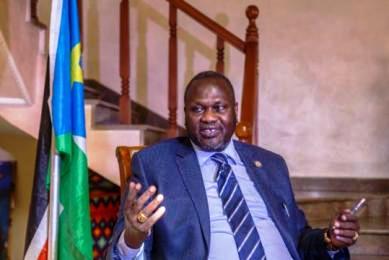S. Sudan rebel leader accuses IGAD of reneging on 2015 peace agreement
March 29, 2017 (JUBA) – South Sudan’s armed opposition (SPLM/SPLA(IO) leader, Riek Machar has expressed “dismay” and profound “disappointment” on the position taken by the Inter-Governmental Authority on Development (IGAD) on the resolution of the conflict in South Sudan during its 30th Extra-ordinary Summit of the Assembly of Heads of State and Government held in Nairobi, Kenya.

A communiqué issued at the sideline meeting Monday, IGAD head of states and governments “condemned the proliferation of armed groups in South Sudan; and called on all armed groups to renounce violence as a means of solving the problems of South Sudan.”
Machar, however, said it was “regrettable” that IGAD decided to abandon its responsibility to continue with its serious efforts that culminated into signing of the agreement on the resolution of the conflict in South Sudan in August, 2015.
“The Agreement gave hope for a new beginning (or the people of South Sudan. The SPLM/SPLA (IO) remains committed to its resuscitation and full implementation thereafter,” Machar said in a statement.
He added, “The IGAD as the broker of the Agreement and the major grantor refused to acknowledge the collapse of the Agreement following the 8 July, 2016 crisis in Juba”.
According South Sudanese rebel leader, the United Nations panel of experts, in their report, indeed confirmed that President Kiir was responsible for the July 2016 crisis that plunged the country back into a full-scale war.
“IGAD has, however, neither condemned nor has it made Kiir accountable for engineering the violence, instead, IGAD decided co-isolate the opposition and continue to work with the regime in Juba,” he said.
Machar said the increase in proliferation of armed groups in South Sudan is a direct result of the sheer brutality of the regime in Juba and the targeting of the civil population based on their ethnicity.
“SPLM/SPLA (IO) is surprised that IGAD condemns the springing up of such groups while it says nothing regarding the war being waged by President Kiir on civilians,” he said, citing the looming genocide reported by the UN on November 11, 2016.
Also of concern, the former South Sudanese First Vice-President said, is the unprecedented level of rape as reported by the UN refugee agency (UNHCHR), the unprecedented exodus of people from the country for refuge of which over 1.6 million South Sudanese are now refugees in neighbouring nations and over 25,0,000 have sought refuge in UN protection of civilian s sites, including in the capital, Juba.
“Moreover, IGAD could not call for establishment of the Hybrid Court of South Sudan to try the perpetuators of war crimes,” said Machar.
He added, “We would want to assert that unless IGAD takes a different approach to deal with the regime in Juba, the regime will continue to act with impunity and the people of South Sudan will continue to resist”.
But while the regional bloc, at its summit, encouraged all the parties to ensure that reforms are implemented as agreed in the peace document, Machar insisted without the resuscitation of the agreement, there is no security sector to be reformed.
“IGAD should be mindful not to arrogate this function to a warring party that is largely being disserted by the majority of South Sudanese,” further stated the rebel leader.
Tens of thousands of people have died and nearly two million displaced in South Sudan’s ongoing civil war, which began in December 2013 as a result of a struggle for power between President Kiir and the country’s former First Vice President Machar.
Famine was last month declared in parts of South Sudan, where U.N agencies said that war and a collapsing economy have left 100,000 people facing starvation. A further 1 million people were classified as being on the brink of famine, according to the World Food Programme (WFP) and other U.N bodies, amidst calls for urgent assistance to avert the looming catastrophe.
(ST)
